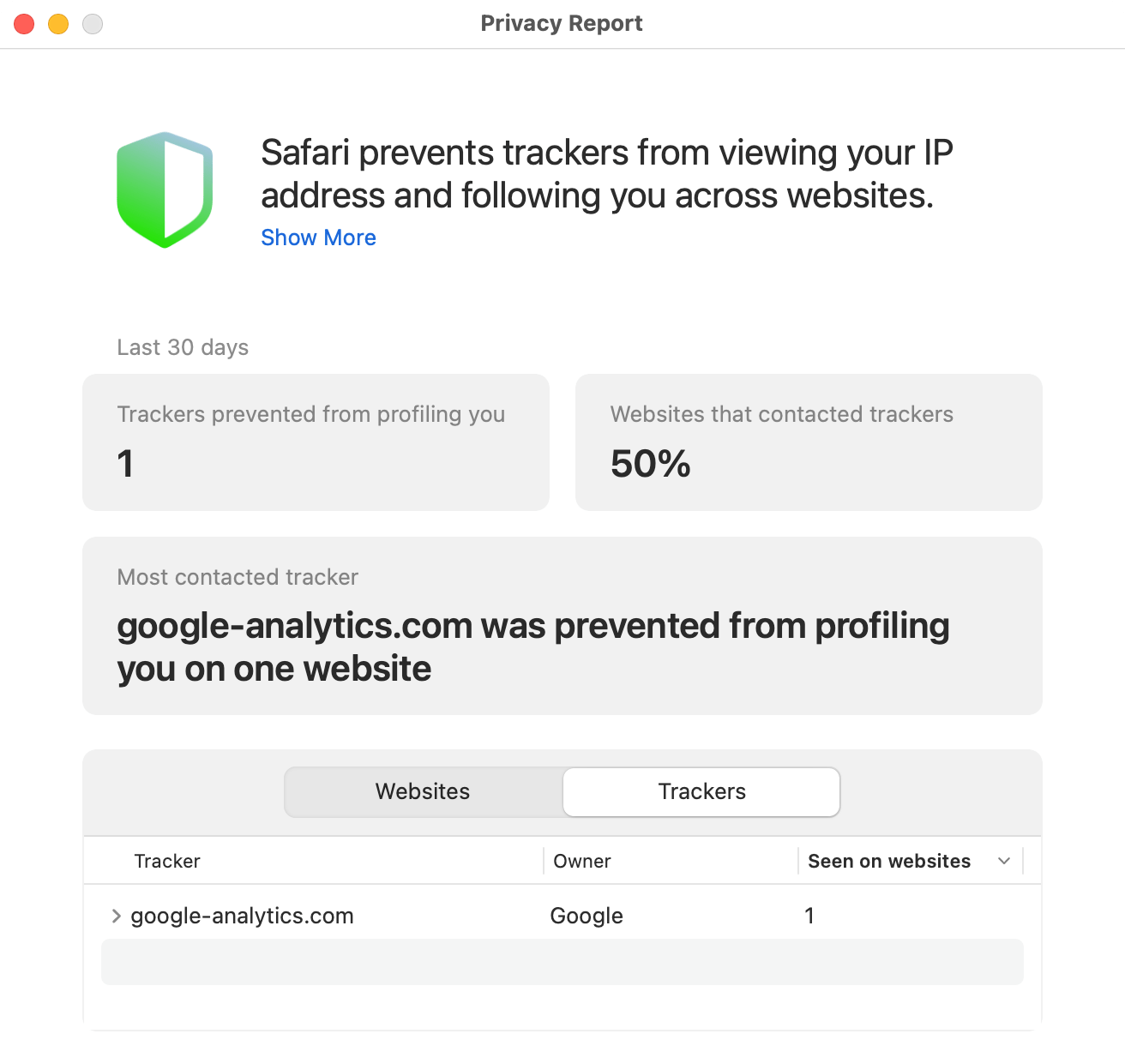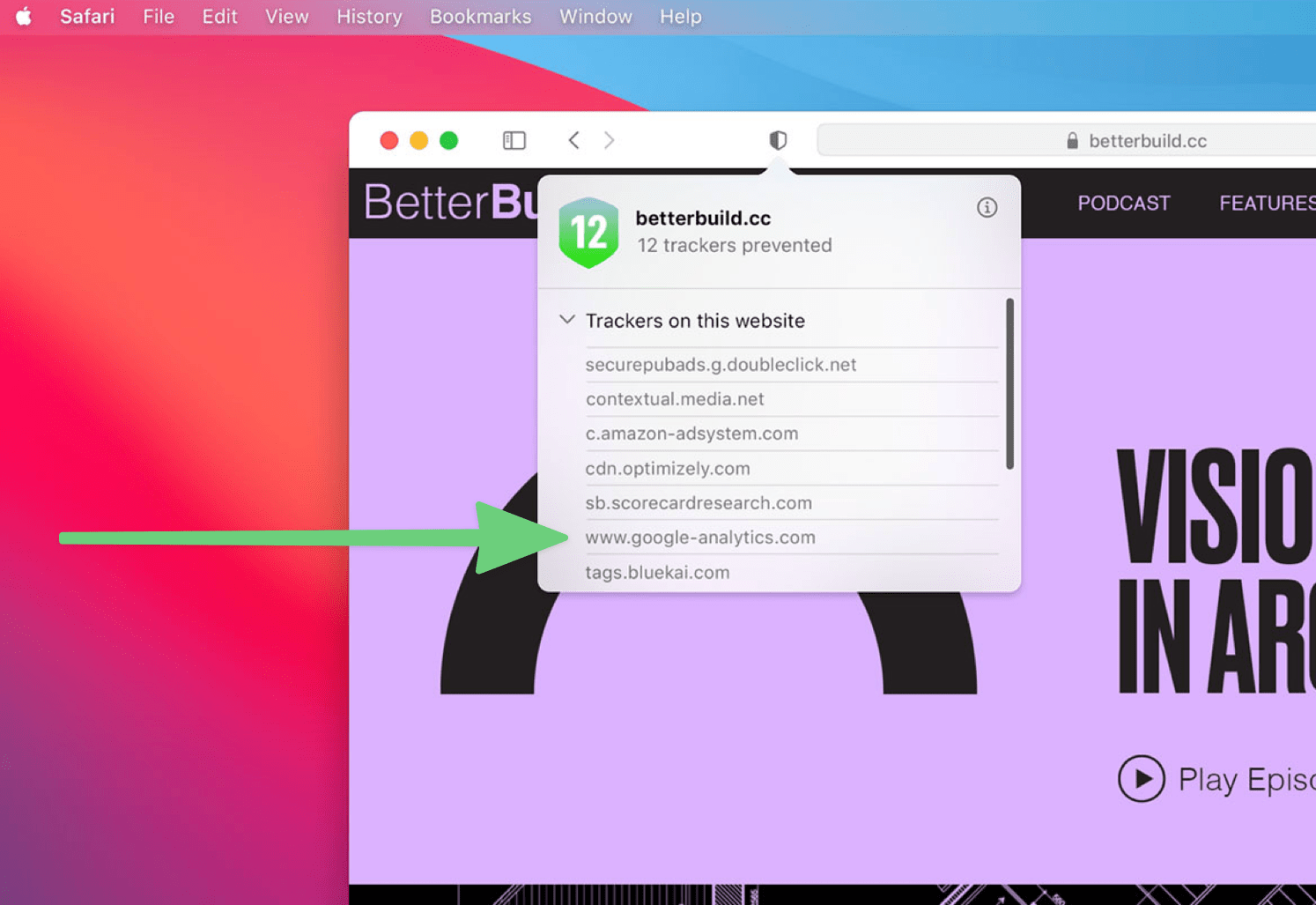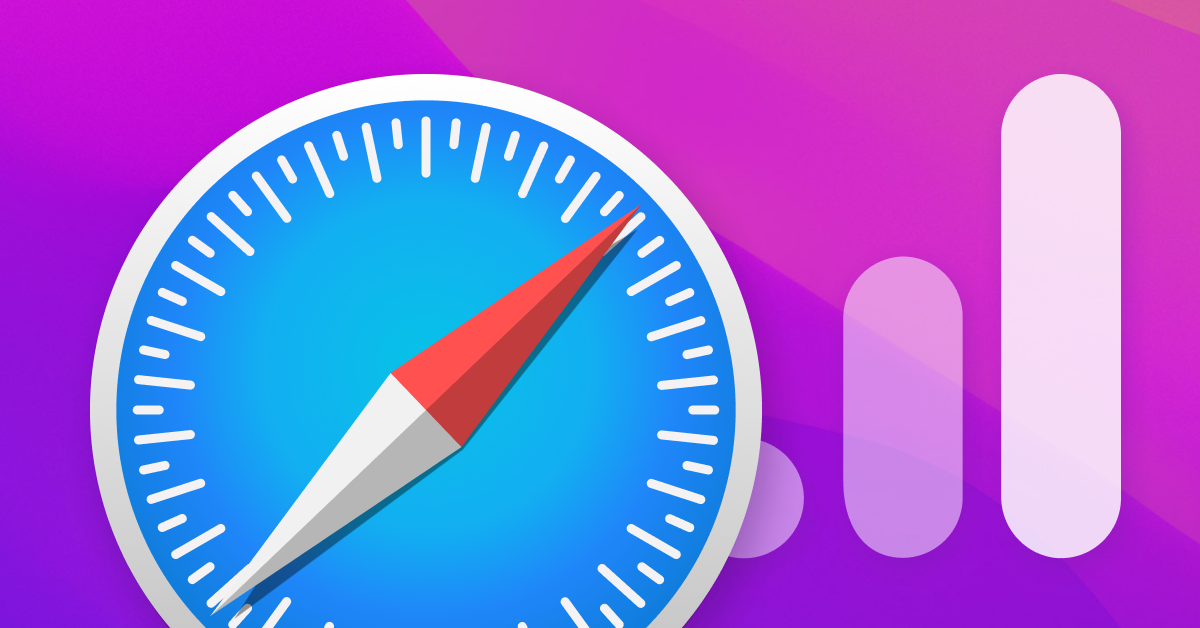In June 2020, Apple launched a new 'Privacy Report' during their first digital WWDC event. This included new privacy guidelines and a summary of trackers blocked by Safari (an Apple product) on iOS, Big Sur, and iPadOS.
The new features caused some confusion among the attendants. From the presentation, it seemed that Safari blocked Google Analytics by default. However, the truth is a bit more nuanced.
So what was the fuss all about again, and what privacy updates have been implemented since? We’ll also touch upon the impact future privacy updates will have on the usability of tools like Google Analytics. What is the likelihood that Safari will ever block Google Analytics?
 Safari Privacy Report
Safari Privacy Report
Let's dive in!
- Safari does not block Google Analytics by default - just third-party cookies
- Move towards privacy
- Why you should move away from Google Analytics
- Final Thoughts
Safari does not block Google Analytics by default - just third-party cookies
With the "Privacy Report," Apple added many new privacy features to help protect users from being tracked across the internet. In the presentation, Apple showed that Google Analytics was the most frequently blocked tracker. This made everyone assume that Safari is blocking Google Analytics from tracking website visitors by default. However, this was a false assumption, and the truth is a bit more complicated.
 Apple Privacy Report presentation
Apple Privacy Report presentation
This was the screenshot shown during the event. Google Analytics is marked as a prevented tracker in the picture, which caused the confusion.
The first to react was analyst Simo Ahava who explained what was really going on:
"When the Safari screenshot from #WWDC says it prevents "http://google-analytics.com..." it likely means ITP flagged that domain as a cross-site tracker and restricts its access to third-party storage. NOT that it actually "blocks GA."
As more information surfaced, it became clear that Safari was not blocking Google Analytics but rather its third-party cookies.
- First-party cookies are stored by the domain (website) you visit.
- Third-party cookies are created by domains other than the one you visit directly, hence the name third-party.
If you want to freshen up your mind regarding first-party vs. third-party cookies, check our "cookie article."
The Intelligent Tracking Prevention in Safari 14 blocks cross-site tracking, limiting only portions in Google Analytics. Website owners should have no trouble seeing their website analytics, as it relies on first-party cookies. Google Analytics still functions as an analytics platform, but you can't use it for retargeting and other features that rely on cross-website tracking.
So Safari does not block Google Analytics, but Apple's "Privacy Report" did accelerate a privacy trend that is not stopping anytime soon.
 The privacy battle, who will win?
The privacy battle, who will win?
Move towards privacy
In the past year, we've seen a crackdown on government bodies on the use of Google Analytics. Privacy laws like GDPR, PECR & CCPA are getting stronger by the day, and organizations seem to care more and more about running their business ethically.
In addition, Apple is moving forward with its privacy operations. They recently added the App Tracking Transparency (ATT) feature in their iOS15, which runs on 72% of modern iPhones.
The ATT consists of a pop-up that asks users if they want to be tracked when they open the app. Facebook announced that this new feature will cost them 10 billion in ad revenue this year alone.
Next to that, Apple launched a commercial showing a girl whose digital identity and belongings are sold off by an auctioneer. At the time of writing, it's 16 days old and already has 7,7 million views on Youtube.
Obviously, the video has some marketing angle to it. Still, the fact that the biggest company in the world has its marketing focus on privacy shows the importance and relevancy of digital privacy.
Why you should move away from Google Analytics
As mentioned above, Safari does not block Google Analytics. You can still still see your website analytics. However, the privacy trend is not slowing down, and Google is just not moving with it.

Phasing out of third-party cookies
Google Analytics users were recently forced to move from Universal Analytics 4 to Google Analytics 4. This move is forcing them to do quite a bit of re-learning on the new version and its different metrics. Additionally, it forced them to ditch third-party cookies, as Google Analytics 4 does not support them.
Universal Analytics 360 users have one more year before the switch, but their time is going to come. Where you are still using Universal Analytics 360, or trying to grasp the new version, this is a good time to ditch Google Analytics and move to a more privacy-friendly service.
Google Analytics creates a blind spot
Although Google Analytics is the most powerful analytics tool there is, it will become more and more inaccurate. Internet users demand privacy, not by knocking on your door and asking for it, but by using tools that block Google Analytics. More and more internet users use ad-blockers or plugins that block Google Analytics scripts.
In addition, many privacy laws (such as the ePrivacy Directive in the EU) require a cookie banner to collect consent. When more and more website visitors refuse consent, you will miss them in your Google Analytics data.
There are Google Analytics alternatives out there
Organizations have taken so long to become more privacy-friendly because of the lack of privacy-friendly tools that are as good as non-privacy-friendly ones. You might want to check other tools if you just use Google Analytics to get insights on your website statistics. There are alternatives to Google Analytics that are simpler to use with more straightforward dashboards that don't sell your visitor data to third parties.
Google Analytics is a privacy nightmare
You might have heard that Google Analytics is an invasive service. That's an understatement.
The core of Google's business model is hoarding personal data from its countless services and feeding it to the online advertising environment (which it controls for the most part). The heart of online advertisement is the real-time bidding (RTB) system through which advertising spaces are auctioned and sold in real time. In order to make these bids as economically efficient as possible, lots of personal data from each visitor are disclosed to the hundreds of advertising companies taking part in the auction.
This is worse than selling data. Google is selling advertising spaces and disclosing immense amounts of personal data on the side, to companies over which it has no control. In other words, it's a privacy nightmare, and it is deeply embedded in the company's business model. No amounts of small tweaks to Google Analytics' privacy settings can fix that.
Data transfers are still an issue
We wrote a lot about Google Analytics' issues with data transfers under the GDPR and about how those issues led six EU countries to ban Google Analytics.
The long legal saga of data transfers came to a halt because of the new EU-US data transfer framework, but this stability is only temporary. Privacy advocates have already announced that they will challenge the new framework, and there is a very real chance that they will succeed in shooting it down like they did in the Schrems I and II.
Incidentally, Microsoft is pouring billions into its EU Data Boundary Program- which may or may not have something to do with the fact that it expects companies to flock to its servers as soon as the new data transfer framework is invalidated by the Court of Justice.
Bottom line, we will likely all be back to square one soon.
Final Thoughts
Digital privacy is becoming increasingly important in our lives, and organizations have started recognizing this. Apple has made privacy one of its future core pillars. Its privacy features are hurting ad platforms like Google and Facebook and making their tools, such as Google Analytics, less powerful. We feel that privacy is a fundamental human right.
Also, more and more people are rightfully concerned about their privacy on the internet and are taking matters into their own hands by switching to privacy-centric apps or browsers.
Data protection authorities are also showing their teeth by declaring the use of Google Analytics unlawful in Italy, Denmark, France & Austria. More EU member states are likely to follow in the coming months, as this was a coordinated effort on a European level.
In addition to the above, we feel that privacy is a fundamental human right, so we created Simple Analytics.
Simple Analytics is not impacted by privacy updates, like the one mentioned above by Apple; it only strengthens our case. We are cookieless by design and never collect any personal data.
We are EU-based. Fully GDPR compliant, and the data we collect is yours. YWe believe in creating an independent internet that is friendly to website visitors. If this resonates with you, feel free to give us a try.
